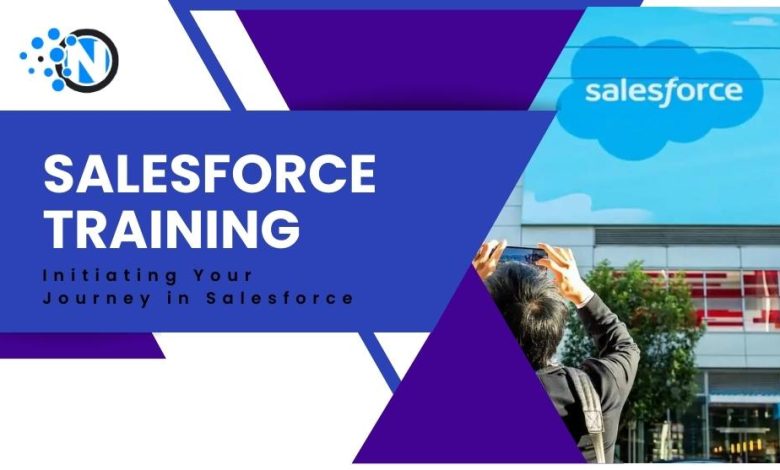Salesforce Training – Initiating Your Journey and Optimal Learning Approaches

In the realm of cloud-based customer relationship management (CRM), Salesforce undeniably stands as a prominent frontrunner. From a technological standpoint, becoming proficient in the diverse range of Salesforce platforms can also prove to be quite financially rewarding. Specialized careers in this domain can yield a median annual salary of £54,975 (based on data from Lightcast, previously known as Emsi Burning Glass, which gathers and analyses job listing information nationwide).
Naturally, this salary potential can further escalate when coupled with the right amalgamation of expertise and training. Employment within Salesforce itself also presents a lucrative opportunity: According to levels.fyi, a platform that gathers collective compensation insights, an associate MTS (Member of Technical Staff) at Salesforce can earn an average salary of £91,411. This includes stock options valued at £15,786 annually, along with a bonus amounting to £9,052.
Even if financial gain isn’t your principal career motivator, mastering Salesforce’s expanding array of applications and services can unveil a plethora of intriguing avenues. Keeping this in consideration, we engaged in discussions with several technologists regarding the significance of Salesforce, optimum strategies for acquiring proficiency, and whether investing your time and resources into it holds merit, especially, when we are talking about Salesforce app development.
Securing a Role in Salesforce: A Comprehensive Guide
Are you aspiring to land a job within the Salesforce ecosystem? Whether you’re new to the industry or looking to advance your career, the path to obtaining a Salesforce job requires careful planning and preparation. This guide outlines essential steps to help you navigate the process successfully.
Develop In-Demand Skills: To excel in the Salesforce job market, it’s crucial to possess the necessary skills. Master the Salesforce platform, including proficiency in CRM functionalities, automation tools, and data management. Additionally, learn coding languages like Apex and Lightning components to demonstrate technical prowess.
Earn Relevant Certifications: Salesforce offers a range of certifications catering to various roles and skill levels. Earning certifications showcases your expertise and dedication. Start with foundational certifications and gradually progress to more advanced ones, tailoring your choices to your career goals.

Build Practical Experience: Theory is important, but practical experience is invaluable. Engage in personal projects, volunteer work, or internships to gain hands-on experience. This will not only enhance your skills but also provide concrete examples to showcase during interviews.
Network within the Community: Join Salesforce-related events, user groups, and online communities to expand your network. Networking can lead to mentorships, job referrals, and insights into industry trends. Engaging with others also demonstrates your genuine interest in the field.
Craft a Standout CV: Tailor your CV to highlight relevant skills, certifications, and experience. Quantify your accomplishments where possible, showcasing how you’ve contributed to previous projects or teams. Make sure your CV reflects your passion for Salesforce and its impact on businesses.
Prepare for Interviews: Be ready to discuss your technical skills, problem-solving abilities, and experiences during interviews. Practice explaining how you’ve tackled challenges using Salesforce tools. Research common interview questions and formulate thoughtful responses.
Demonstrate Soft Skills: In addition to technical expertise, employers value soft skills such as communication, teamwork, and adaptability. Provide examples of situations where you’ve effectively collaborated, communicated, and adapted to changes.
Research Potential Employers: Before applying, research the companies you’re interested in. Understand their values, products, and industry presence. Tailor your application to demonstrate how your skills align with their needs and goals.
Utilise Online Platforms: Leverage professional networking platforms like LinkedIn to showcase your skills, connect with industry professionals, and stay updated on job opportunities. Engage in relevant discussions and share insights to establish yourself as a knowledgeable resource.
Building Projects and Portfolios: Create your own projects to showcase your skills. Develop applications, solve business challenges, and present your work through a portfolio that potential employers can review.
By combining theoretical knowledge with practical experience, you’ll become a well-rounded Salesforce professional. Networking and personal branding are also vital components of your journey, as we’ll explore in the next section.
Stay Persistent and Positive: Landing a Salesforce job might take time and perseverance. Stay positive, keep refining your skills, and adapt your approach based on feedback and experiences.
Contributing to the Salesforce Community: Give back to the community by sharing your knowledge, volunteering, or mentoring newcomers. Contributing enriches your own learning journey while making a positive impact.
Choosing Your Salesforce Path: Roles and Specializations
Salesforce offers a variety of roles, each catering to specific skill sets and responsibilities. Let’s explore some of the prominent roles within the Salesforce landscape:
Salesforce Administrator: As a Salesforce administrator, you’ll be the go-to person for configuring and maintaining the Salesforce environment. You’ll manage user access, customize the platform to meet business needs, and ensure data security.
Salesforce Developer: Developers play a crucial role in extending Salesforce’s capabilities. You’ll be responsible for creating custom applications, integrations, and enhancements using programming languages like Apex and Visualforce.
Salesforce Consultant: Consultants collaborate with clients to understand their business requirements and design Salesforce solutions accordingly. Your expertise will guide organizations in optimizing their CRM strategies.
Salesforce Architect: As a Salesforce architect, you’ll be the visionary behind complex Salesforce implementations. You’ll design scalable and efficient solutions that align with business goals, considering factors like data modeling, security, and integration.
No matter which path you choose, acquiring specialized knowledge and skills is essential. In the upcoming sections, we’ll explore how to gain the education and training needed to excel in your chosen Salesforce role.
Ending Note
Securing a Salesforce job requires a combination of technical expertise, practical experience, networking, and a proactive approach. By following these steps and maintaining a dedication to growth, you’ll increase your chances of successfully embarking on a rewarding career within the Salesforce ecosystem.




